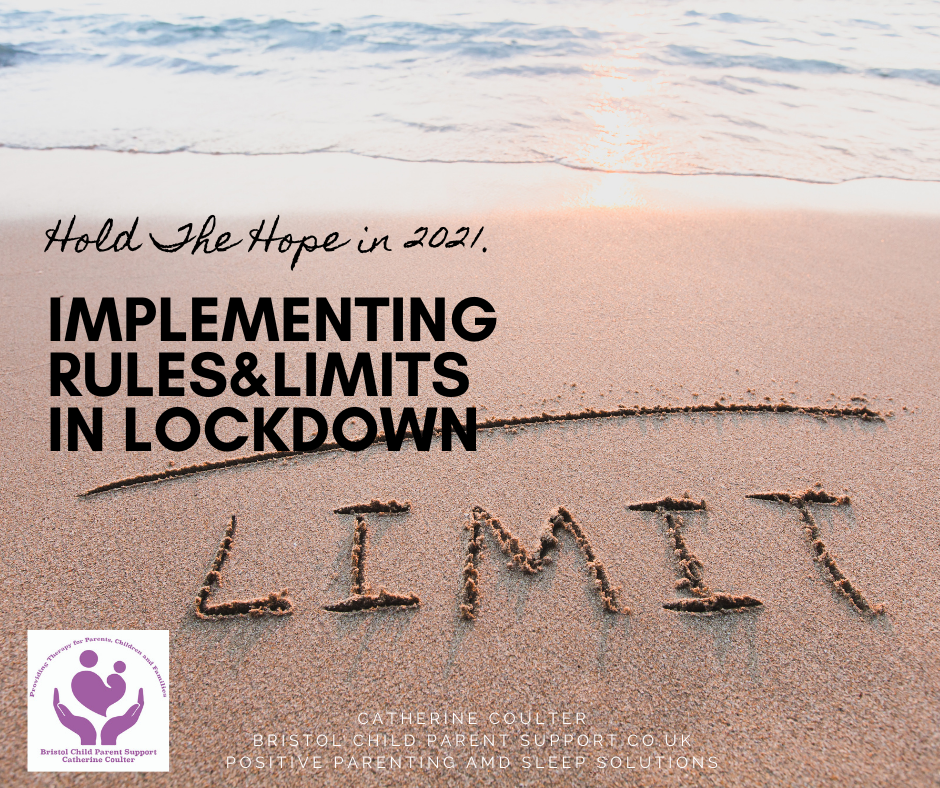How are you faring in this unprecedented time? Schools are closed again. Homeschooling is yet another addition to Lockdown’s already tricky work/life balance. How can you even contemplate implementing limits or rules when we live in a collective NO! Even though limits may be infuriating from your child’s perspective, they are also like gates keeping everyone safe and secure during great uncertainty. Also, it teaches self-control and discipline. And yes, they can be implemented with kindness, respect, and authority.
Here are some ideas that may help you now:
#1. Don’t forget to think Beyond the Behaviour Management Strategy.

Behaviour management is most effective when combined with connected time, positive communication, and affection. Don’t forget to balance this with special time if you are implementing limits. This is important for children of all ages. Even teenagers need you to listen and have time to talk together.
#2. Limits can be even more critical in times of stress because they:
- Set out clear boundaries and expectations about what is acceptable and unacceptable behaviour.
- Help you to define your battles when you may be low in energy.
- Promote respect between family members.
- Enable children to feel contained at a time of great uncertainty and anxiety.
#3. What some Simple Limits Look Like:
Did you know:
The average parent gives 17 commands in half an hour, in families with
The Incredible Years, Carolyn Webster -Stratton ( I am an Incredible Years Trainer)behavioural difficulties, this raises to 40! (Wow).

- Always think about what behaviour you expect, and be developmentally realistic.
- Ensure they are easy to understand and use short sentences. Children cannot process lengthy statements and need you to say them slowly.
- Give “do” commands with the verb at the beginning. For example:
Put away your toys, rather than would you put your toys away?
Walk slowly, instead of stop running around
Speak softly, rather than don’t shout
Negative commands cause children to feel incompetent and useless.
#4. What Would Some House Rules look like?
Remember to choose what is essential, especially during the lockdown. Think about what matters now and leave the rest. It’s too exhausting to manage everything at once.
- Safety is always a priority.
Hitting, kicking, abusive language, seatbelts, and road safety must be handled. This means you must act immediately and take them away from the situation. The key is to do it with empathy, but we still have to offer a consequence. However, your child is more likely to comply if they feel understood and know there is another opportunity to change.
I know you are angry with your brother for taking your toy but it’s not alright to kick him. I am going to give you our agreed consequence, even though I know that you are trying to control the “anger”. So next time, Let’s try to speak out the “anger” and keep your feet safely on the floor.
- Manners – for example, ‘We wait until others have finished talking before we talk.’
- Daily routines – for example, ‘We take turns clearing the table and filling the dishwasher each night.’
- Respect for each other – for example, ‘Knock before going into bedrooms’.
Tip: Every family’s rules and limits will be different. Your family rules will be influenced by your beliefs, culture and values, your situation, and your child’s maturity and needs. What may work for your friends may not work for you.
#5.How to Implement Rules.
Everyone must be involved in making and discussing rules. You can implement family meetings. However, you must discuss your ideas with your partner or find a buddy if you are a single parent. Alternatively, if you are co-parenting, discuss this with your ex-partner. Children as young as 3/4 can be present. For older children, it encourages them to take responsibility. When you involve children and teenagers in making the rules, it helps them understand and accept the practices and why your family needs them. This means they’re more likely to see the rules as fair and will be motivated to stick to them.
Children with additional needs may need more help understanding and remembering the rules. Visual cues may help them, and, in addition, gentle reminders.
If you are interested, here is my blog on implementing Family Meetings. Family Meetings are one of my favourite parenting tools.
In Conclusion.
This is when we feel a bit weary, uncertain, and more. My advice would be to work on one behaviour at a time. Be kind and compassionate to yourself and your child. You are not a bad parent, and they are not a bad child.
Thank you for taking the time to read this and for your commitment to the well-being of your child and family. In addition, your willingness to keep growing and holding hope. Remember: parenting is hard work, and you all deserve support. And when it all starts to feel impossible, ask for help. If you need help and support, contact me for a consultation or join my newsletter community. With Gratitude Catherine
NB. Next time, I will discuss consequences and put up some new webinars for parenting, tantrums, sleep, and more.



